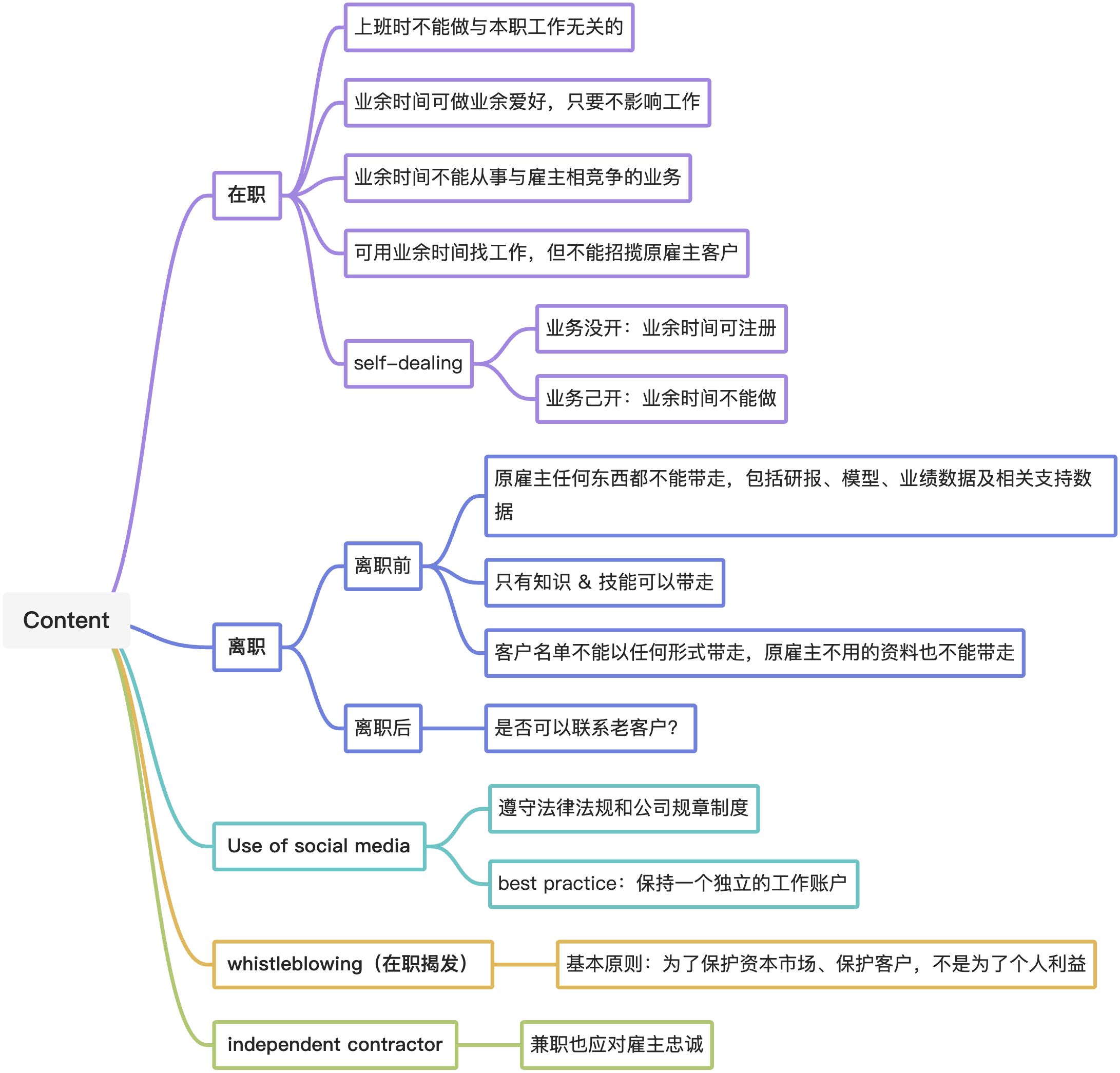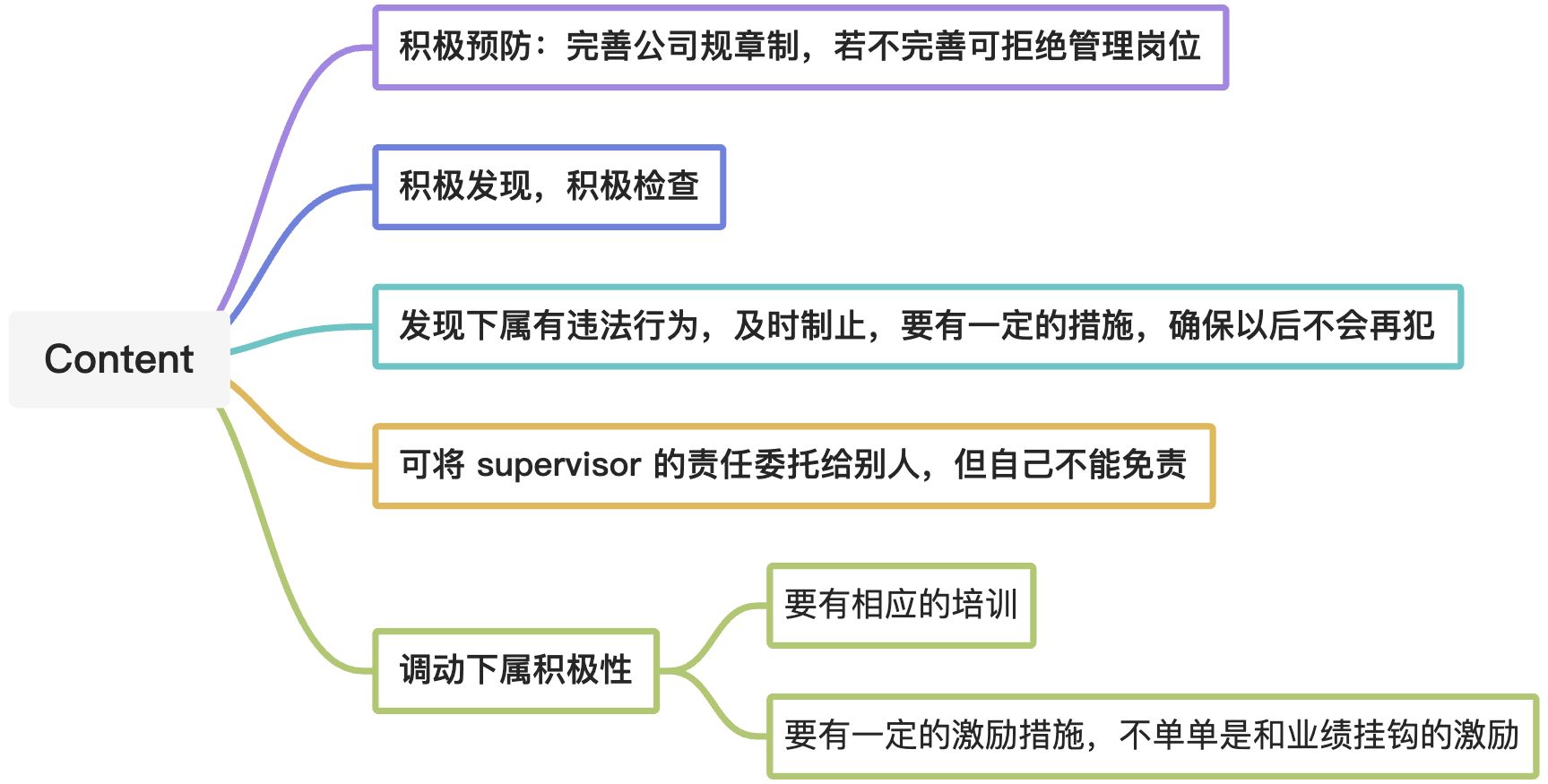A:Loyalty

In matters related to their employment, must act for the benefit of employer and not deprive employer of the advantage of their skills and abilities, divulge([daɪˈvʌldʒ] 泄露; 透露)confidential information, or otherwise cause harm to their employer.
(1)Guidance
(a)Independent Practice
“Undertaking independent practice” means engaging in competitive business, as opposed to making preparations to begin such practice.
- Should abstain(弃权; 戒; 回避; 戒除; 离开) from independent competitive activity that could conflict with the interests of their employer.
- Although 4-A does not preclude from entering into an independent business while still employed, those who planning to engage in such practice for compensation must notify their employer and describe:
- types of services they will render to prospective independent clients
- the expected duration of the services
- the compensation for the services
- Although 4-A does not preclude from entering into an independent business while still employed, those who planning to engage in such practice for compensation must notify their employer and describe:
Should not render services until they receive consent from their employer to all of the terms of the arrangement.
(b)Leaving an Employer
Before leaving, the following will cause a violation:
- Misappropriation(侵占;私吞;贪污;挪用;滥用)of trade secrets
- Misappropriation of client lists.
- Memorizing client lists (name and address) is not permitted, unless the info does not come from the records of former employer or violate noncompete agreement.
- Misuse of confidential information
- Soliciting employer’s clients prior to cessation([seˈseɪʃn] 停止; 终止; 中断; 暂停) of employment.
- Self-dealing (appropriating for one’s own property a business opportunity or information belonging to one’s employer)
- After leaving, the following will cause a violation:
- Violation of terms in existing non-compete contract
- Taking records or files (even rejected idea list) to a new employer without the written permission of the previous employer
- Once notice is provided to the employer of the intent to resign, must follow the policies and procedures to notify clients of planned departure.
- Once an employee has left the firm, the skills and experience that an employee obtained while employed are not “confidential” or “privileged” information.
- Not prohibit experience or knowledge gained at one employer from being used at another employer.
- Simple knowledge of names and existence of clients is not confidential information unless deemed such by an agreement or by law.
Firm records or work performed on behalf of the firm that is stored in paper copy or electronically while employed should be erased or returned to the employer unless the firm gives permission to keep those records after employment ends.
(c)Use of social media
Communications through social media platforms that potentially reach current clients should adhere to the employer’s policies and procedures regarding notification of departing employees.
Specific accounts and user profiles of members and candidates may be created for solely professional reasons, including firm approved accounts for client engagements. Such business related accounts would be considered part of the firm’s assets, thus requiring members and candidates to transfer or delete the accounts as directed by their firm’s policies and procedures.
- Best practice for members and candidates is to maintain separate accounts for their personal and professional social media activities.
- Members and candidates should discuss with their employers how profiles should be treated when a single account includes personal connections and also is used to conduct aspects of their professional activities.
(d)Whistleblowing
Personal interests, and interests of employer, are secondary to protecting the integrity of capital markets and the interests of clients
When an employer is engaged in illegal or unethical activities, actions taken by the employee that would normally violate loyalty to employer (e.g. violating certain policies, contradicting employer instructions, or preserving a record by copying employer records) may be justified. Such action would be permitted only if the intent is clearly aimed at protecting clients or the integrity of the market, not for personal gain.
(e)Nature of employment
The applicability(适用性,相关性;适用范围) is based on the nature of the employment:employee versus independent contractor. Duties within an independent contractor relationship are governed by the oral or written agreement between the member and the client.
(2)Recommended Procedures for compliance
If the policies are not currently in their procedures, should encourage firms to adopt the following:
- Competition policy
- Must understand any restrictions placed by the employer on offering similar services outside the firm while still employed.
- If an employer elects to have its employees sign a noncompete agreement, should ensure that the details are clear and fully explained prior to signing the agreement.
- Termination policy
- Should establish clear procedures regarding the resignation process, including addressing how the termination will be disclosed to clients and staff.
- May also outline the procedures for transferring responsibilities of ongoing research responsibilities and account management.
B:Additional compensation arrangements
- Competition policy
Additional compensation:雇主支付给我们的正常报酬以外、与我们本职工作相关的其他报酬或好处
- Additional compensation arrangement 与独立客观性对比
- 只披露、没得到同意:违反 Additional compensation arrangement
- 没披露:违反 Additional compensation arrangement、独立客观性
- Must not accept gifts, benefits, compensation, or consideration that competes with, or might reasonably be expected to create a conflict of interest with, their employer’s interest unless they obtain written consent from all parties involved.
- Guidance
- No gifts, benefits, compensation or consideration are to be accepted which may create a conflict of interest with the employer’s interest unless written consent is received from all parties.
- “Written Consent” includes any form of communication that can be documented (for example, communication via computer e-mail that can be retrieved and documented).
- Must obtain permission for additional compensation/benefits because such arrangements may affect loyalty and objectivity and create potential conflicts of interest.
C:Responsibility of supervisors

Members and Candidates must make reasonable efforts to ensure that anyone subject to their supervision or authority complies with applicable laws, rules, regulations and the Code and Standards.
(1)Guidance
Can delegate, but not relieve of supervisory responsibility.
Exercise reasonable supervision by establishing and implementing written compliance system and ensuring periodic review on the system.
- Members and candidates may have supervisory responsibility but not the authority to establish or modify firm-wide compliance policies and procedures or incentive structures. Such limitations should not prevent a member or candidate from working with his or her own superiors and within the firm structure to develop and implement effective compliance tools, including but not limited to:
- At a minimum, Standard 4-C requires that members and candidates with supervisory responsibility make reasonable efforts to prevent and detect violations by ensuring the establishment of effective compliance systems.
- a code of ethics
- compliance policies and procedures
- reviewing employee actions to determine whether they are following the rules
- education and training programs
- an incentive structure that rewards ethical conduct
- adoption of firm-wide best practice standards (e.g.:the GIPS Standards, CFA Institute Asset Manager Code of Professional Conduct).
If a member or candidate has adopted reasonable procedures and taken steps to institute an effective compliance program, then the member or candidate may not be in violation of Standard 4-C if he or she does not detect violations that occur despite these efforts.
(b)Inadequate Procedures
Those who have supervisory responsibility should bring an inadequate compliance system to the attention of the firm’s senior managers and recommend corrective action.
If the member or candidate clearly cannot discharge supervisory responsibilities because of the absence of a compliance system or because of and inadequate compliance system, the member or candidate should decline in writing to accept supervisory responsibility until the firm adopts reasonable procedures to allow adequate exercise of supervisory responsibility.
Should know what an adequate system is and make reasonable efforts to see that appropriate procedures are established, documented, communicated to covered personnel and followed.
- Once such procedures are in place supervisor must make reasonable efforts to ensure that the procedures are monitored and enforced.
- Once knowing a potential violation supervisor must promptly initiate an investigation to ascertain([ˌæsərˈteɪn] 查明; 弄清) the extent of the wrongdoing.
- Relying on employee’s statements or assurances that the wrongdoing will not recur is not enough.
- assurance:保证; 担保; 自信; 人寿保险
- recur:反复出现; 重现; 再发生
- Reporting the misconduct up the chain of command and warning the employee to cease the activity are also not enough.
- Should take steps to ensure that the violation will not be repeated by placing limits on the employee’s activities or increasing the monitoring of the employee’s activities.
- Relying on employee’s statements or assurances that the wrongdoing will not recur is not enough.


